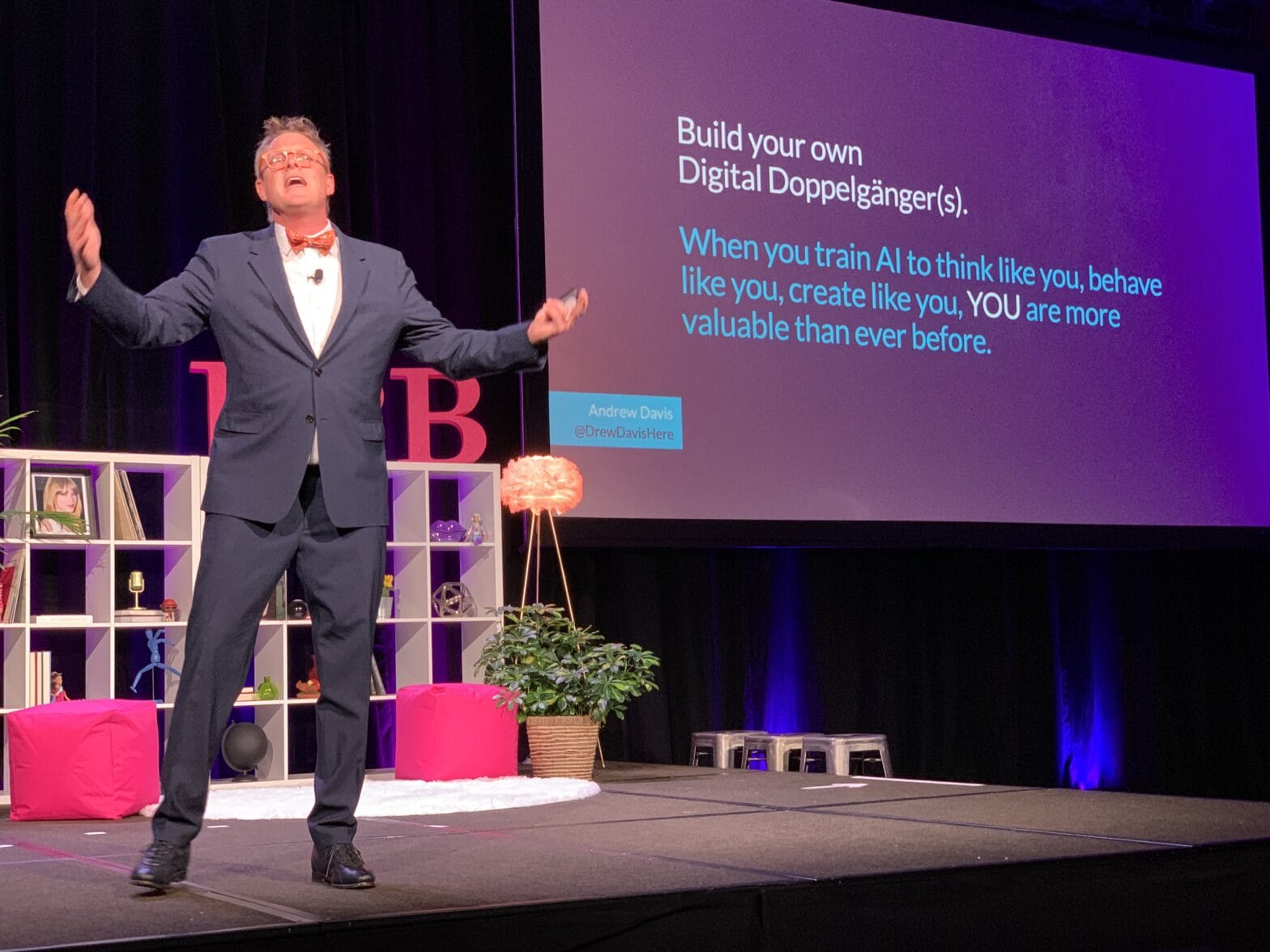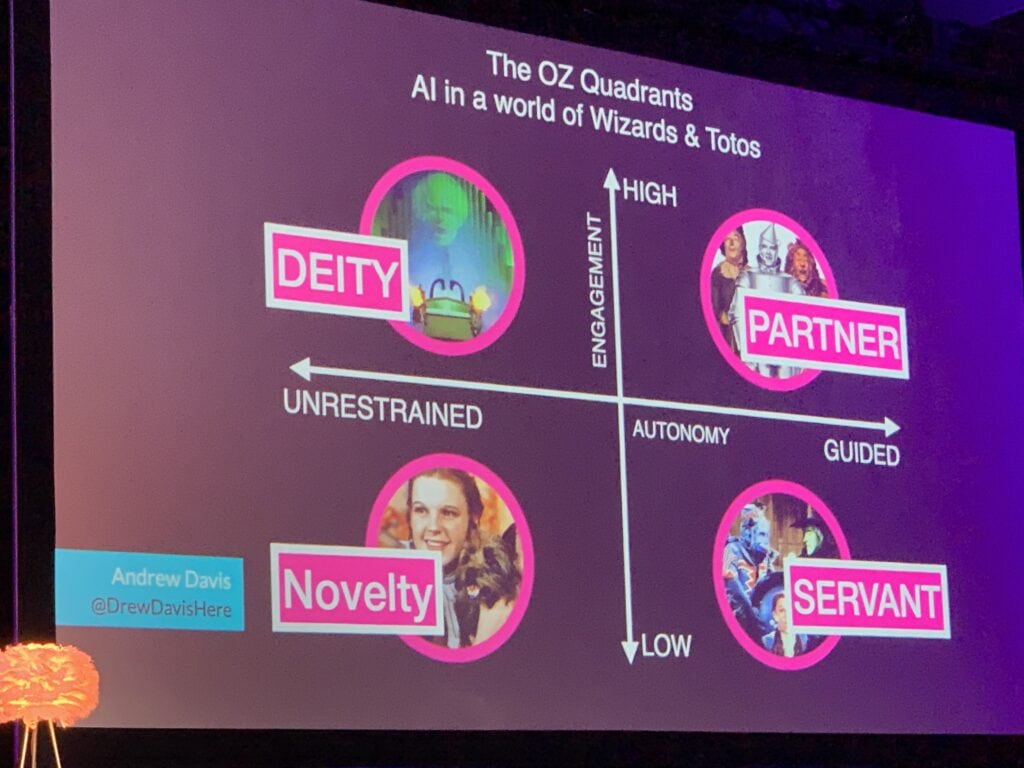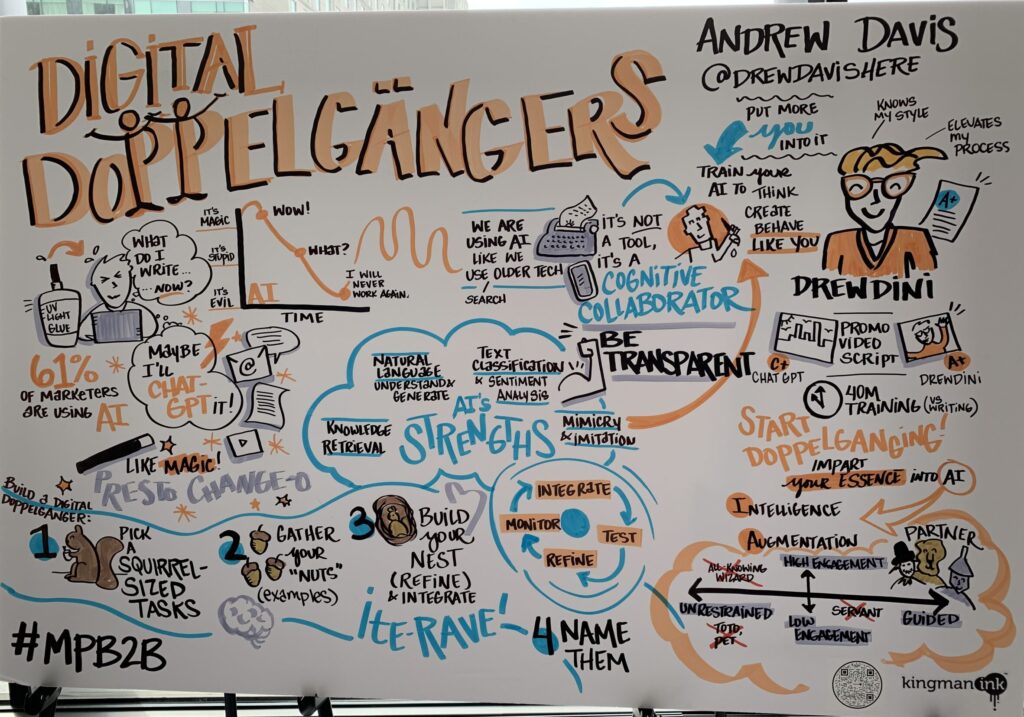
Are you underestimating AI?
AI: “It’s magic. It’s stupid. It’s evil.”
That’s how author and speaker Andrew Davis described artificial intelligence (AI) in his keynote that opened the 2023 Marketing Profs B2B conference.
Andrew warned marketers not to give up on AI by expecting too much too soon. He reminded us that, at first, people try to use new technology like generative AI the same way the same way they used older technologies.
That’s how they wind up disappointed.
For example, are we trying to use Chat GPT like a search bar?
Andrew reminded us of Lumiére’s Law. Brothers August and Louis Lumiére invented the Cinématographe motion picture system in 1895. They made 10 motion pictures, then tested them with audiences.
Their conclusion? “The cinema is an invention without any future.” So, they abandoned moviemaking. Oops.
Are marketers underestimating AI the way that the Lumiéres underestimated movies?
Andrew said we need to see AI for what it is: “If Photoshop is a tool, AI is an artist. If a phone is a tool, AI is a cognitive collaborator.”
He added, “To get more out of AI, put more of yourself into it.”
Andrew recommends building your own AI Doppelganger, an AI-created digital twin that mimics your behaviors and preferences. That’s how he created Drewdini.
Drewdini helps Andrew perform tasks such as writing video scripts, helping with YouTube, and serving as an email strategist.
Marketers will need to give AI plenty of hands-on guidance to reap the benefits. Drewdini requires lots of human attention and guidance to succeed.
Treat AI as your partner, Andrew advises. Don’t treat it like a servant, novelty or deity.

Create a digital twin to help you
Once your Doppelganger’s aboard, they can help you do work that AI is particularly good at, such as:
- Language understanding and generation
- Knowledge extraction and information retrieval (although AI may hallucinate “like your drunk friend”)
- Sentiment analysis and text classification
- Mimicry and imitation.
Don’t assign AI big tasks, instead “chisel with it.” Andrew’s advice on working with your Doppelgänger includes these nuggets:
- Select a squirrel-sized task, bigger than an acorn but smaller than a tree.
- Gather your nuts (brain) by training your Doppelganger with samples of your work, such as feeding it five video scripts.
- Build your nest (heart) by feeding AI one nut at a time, tasking it with new tests, and refining its outputs.
- Iterate new ideas and integrate them. Test, refine, and monitor them.
- Name your Doppelganger and use AI to generate a picture of him or her.

Meet Drewdini. He even has his own email address: drewdini@monumentalshift.com
Make AI your public partner, not a shameful secret
The AI paradox, Andrew notes, is that people use AI in secret today, but they still can’t fathom other people secretly using AI.
Make your Doppelganger your public partner, not a secret agent. Share the fact you use AI with anyone who wants to know. [Note: That’s a key principle we follow at Crystal Clear Communications: when we use AI, we’ll be transparent about it. No AI was used to create this blog.]
If you’re up for a treat, enjoy Andrew’s video on Lumiere’s law.
Insights into what’s next for marketing AI
Paul Roetzer, founder and CEO of the Marketing AI Institute, and Christopher S. Penn, founder of Trust Insights, joined Ann Handley for a panel discussion on AI.
Unlike many self-proclaimed AI experts, both Paul and Chris have worked on AI in marketing for years and both have written books on AI in marketing.
The velocity of change in AI is staggering.
The field moves so fast, Paul and Chris both needed to update their presentations in the hours before the conference. For example, as of the first week of October 2023, the news was:
- Chat GPT-4V now generates both words and pictures.
- Open source models have a “longer window,” so you can train them on 32,000 words instead of only 5,000.
- Amazon announced plans to invest $4 billion into Anthropic and its AI model,
Small companies hold an AI advantage
“Among the big brands, no one has a plan for AI now,” Paul said. It’s a mess, which reflects the battles between IT departments versus Marketing departments.
Such battles create layers of complexity and obstacles – which means that, right now, small companies hold the advantage.
Paul advises companies to “Set up guardrails now since employees will use AI at work anyway.” Form an AI Council to gain buy-in and govern AI practices across the company.
Paul’s hope is that “AI gives us time back. It saves time and drives efficiency. We can redistribute time back to ourselves and our family.”
AI will enable you to do what you can’t do today. “Skill is not an obstacle anymore,” Chris declared. People who can’t write music or draw a picture or write code can accomplish these tasks today by giving AI plain language prompts.
If you want to go deeper into AI and marketing, here’s my 2023 interview with Paul Roetzer.
Note: we began writing about AI and machine learning way back before it was mainstream, back in 2019.


